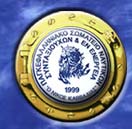|
Nikos Kavvadias was born in Manchuria
in 1910 of Cephalonian parents. He grew
up in Pireas and from a very early age succumbed
to the call of the sea. AT the age of 20 he boarded
a ship as a seaman and by 1939 he had completed
his diploma as a radio operator.
The long voyages on cargo ships provided him
with the opportunity to travel far, enrich his
knowledge and helped him to avoid becoming what
he described as " an undeserving lover of long
voyages and blue horizons" . From this point on
the seaman Kavvadias begins to express through
poetry his experiences at sea. His "Marabu"
collection, published in 1933, established
him as the poet of the sea and became a source
of inspiration for many artists.
The collection's main themes were the seaman,
nostalgia, life, death, women. His main character
is the seaman who confronts his fate at every
port and storm and tries to overcome the misery
in his life through the confrontation. His second
collection. "Pousi" was published in 1947
and featured the same themes and cast of characters.
However, the poet's maturity was evident by then
and his rich experiences provided the base for
a more global appeal to the collection.
In 1954 he published the book "Vardia"
which established him as a storyteller as well.
The book was much more than just a collection
of travel experiences. The poet of the sea comes
through the lines as an authentic Cephalonian.
The language used, the characters, even the curses,
were an undoubtable depiction of the island and
the special and often strange characteristics
of its inhabitants His third poetry collection,
"Trasverso", was published in 1975,
shortly after his death.
By this time, Kavvadias was known as "Marabu".
In this collection he comes across as an experienced
traveller, mature in his expression, but still
warm and human. His love for the sea was only
surpassed by his love for freedom and democracy,
something that made him an active participant
in all the struggles of Greece for freedom and
democracy. He participated in the writers' resistance
movement during the German occupation. He also
became involved in the struggle to reinstate democracy
during the seven-year military regime.
He wrote powerful and brave lines of poetry which
during the Occupation he published under the name
"Tapeinos" ("Humble"). The poet of open
horizons always dreamed of dying at sea, dreading
a death on land. This however was not to be as
he passed away in February of 1975 in an
Athens Hospital.
|


